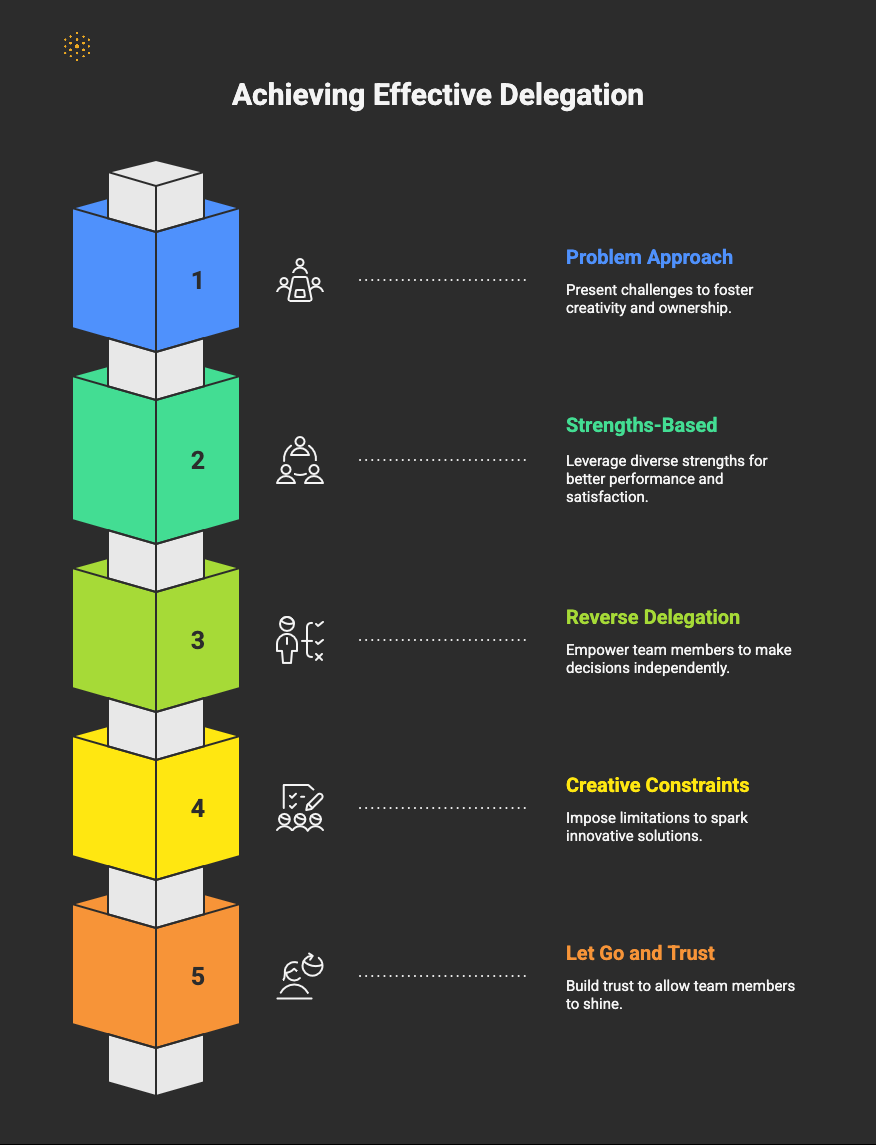How can leaders delegate effectively to empower teams and improve results?
Delegate the problem and desired outcomes, not step-by-step plans; match work to people's strengths and set clear decision authority to avoid reverse delegation. Use creative constraints and focus on results while starting small and reinforcing trust.
Delegation is hailed as a leadership essential, yet most managers struggle to do it well.
Forbes notes that only 30% of managers think they can delegate well, and of those, just 1 in 3 is seen as a good delegator by their team.
That means only about one manager in ten truly knows how to empower others.
Done right, delegation isn’t just about handing off work, it’s about building trust, developing people, and sparking innovation.
Here are 5 unconventional, research-backed strategies to help you delegate in a way that frees your time, strengthens your team, and elevates your leadership.
1. The "Problem, Not the Plan" Approach
Instead of giving your team a step-by-step plan, present them with a problem and let them figure out the solution.
This might sound scary, but it's one of the most powerful things you can do to foster creativity and ownership.
A study of 248 hotel employees found that when managers delegate authority rather than instructions, it boosts psychological empowerment, which in turn drives employees to take initiative and actively seek feedback.
In other words, when you hand over the “what” instead of the “how,” you’re not just trusting your team; you’re equipping them to think independently and improve continuously.
How to do it
- Frame the task as a challenge: Instead of saying, "I need you to create a new marketing campaign," try, "We need to find a way to reach a new audience with our product. How can we do that?"
- Provide context, not instructions: Give your team the background information they need to understand the problem, but resist the urge to tell them how to solve it.
- Encourage experimentation: Let your team know that it's okay to try things that might not work. Failure is a part of the innovation process.
Also Read: How to list team working skills on a resume?
2. The "Strengths-Based" Delegation Model
You probably know your team's strengths and weaknesses. But are you using that knowledge to its full potential?
Research on team composition shows that when diverse character strengths and roles are represented, such as “Idea Creators” or “Relationship Managers”, teams perform better, report higher satisfaction, and collaborate more effectively.
Leveraging these strengths in delegation isn’t just good for morale; it’s good for results.
How to do it
- Have open conversations: Talk to your team members about their career goals and what they enjoy doing. Ask them what skills they want to develop and what kind of work gets them excited.
- Look for hidden talents: Don't just focus on the skills that are obvious. Pay attention to your team members' hobbies and interests outside of work. You might be surprised by the hidden talents you uncover.
- Create opportunities for growth: Once you know your team's strengths, look for opportunities to delegate tasks that will help them develop those strengths. This could be anything from giving them a new project to letting them lead a team meeting.

3. The "Reverse Delegation" Antidote
Have you ever delegated a task, only to have the person come back to you with a question every five minutes?
This is a classic case of "reverse delegation," and it's a major productivity killer.
According to reports, managers spend about 14% of their time redoing tasks or fixing mistakes because of poor delegation (the number jumps to 24% in some regions).
When you push decisions back to the person you delegated to, you not only save your time, you also help them grow into the role.
How to do it
- Ask for solutions, not questions: When a team member comes to you with a problem, don't just give them the answer. Instead, ask them, "What do you think we should do?"
- Empower them to make decisions: Give your team members the authority to make decisions on their own. Let them know that you trust their judgment and that you're there to support them, not to micromanage them.
- Set clear boundaries: It's okay to set boundaries around your time. Let your team know when you're available for questions and when you need to focus on other things.
Also Read: How to answer "What is your leadership style" interview question?
4. The "Creative Constraints" Method
Sometimes, the best way to spark creativity is to impose constraints. This might seem counterintuitive, but it's a technique that has been used by some of the most innovative companies in the world.
When you give your team a tight deadline, a limited budget, or a specific set of resources, you're forcing them to think outside the box and come up with creative solutions.
How to do it
- Set a "crazy" deadline: Challenge your team to complete a task in half the time they normally would.
- Give them a limited budget: See what they can come up with a shoestring budget.
- Take away a key resource: What would they do if they didn't have access to their usual tools or resources?
Also Read: How to build an execute presence and inspire confidence as a leader?
5. The "Let Go and Trust" Philosophy
At the end of the day, effective delegation all comes down to one thing: trust. You have to trust your team to do the job, and you have to trust them to do it well.
This can be the hardest part of delegation, but it's also the most important.
When you let go of the need to control everything, you're creating a space for your team to shine. A great way to build this trust is to recognize their accomplishments.
How to do it
- Start small: If you're new to delegation, start with small, low-risk tasks. As you build trust, you can gradually move on to bigger and more important things.
- Focus on the outcome, not the process: As long as the job gets done and the results are good, does it really matter how your team got there?
- Celebrate successes: When your team does a great job, make sure to celebrate their success. This will reinforce their confidence and make them more likely to take on new challenges in the future.

Final Thoughts
Mastering delegation is about empowering your team, building trust, and creating space for innovation.
By applying these unconventional strategies, you not only free up your own time but also strengthen your team’s skills and confidence.
And just like effective delegation, your own career growth benefits from the right support.
Hiration can help you create an ATS-friendly, achievement-focused resume, sharpen your interview skills with AI-powered practice, and optimize your LinkedIn profile, so you can position yourself for the opportunities you want next.
No matter where you are in your journey, small, intentional changes today can set you up for greater success tomorrow!
Frequently Asked Questions
-
Why does delegation matter for leaders?
It builds trust, develops people, and sparks innovation.
-
How do you apply the "Problem, Not the Plan" approach?
Present the problem, provide context not instructions, and encourage experimentation.
-
What is the difference between delegating the problem and delegating a plan?
Delegating the problem hands over the what and lets the team figure out the how; delegating a plan gives step-by-step instructions.
-
How does strengths-based delegation improve team performance?
When diverse strengths and roles are represented, teams perform better, report higher satisfaction, and collaborate more effectively.
-
What is reverse delegation and how do you stop it?
Reverse delegation is when tasks bounce back as questions and it's a major productivity killer. Ask for solutions, empower decisions, and set clear boundaries.
-
How much time do managers lose due to poor delegation?
Managers spend about 14% of their time redoing tasks or fixing mistakes because of poor delegation, and it jumps to 24% in some regions.
-
How do creative constraints help when delegating?
Imposing constraints can spark creativity; use tight deadlines, limited budgets, or specific resources to force fresh solutions.
-
How should you start delegating if you are new to it?
Start with small, low-risk tasks, then move to bigger and more important things as trust builds.
-
How do you build trust while delegating?
Effective delegation comes down to trust; recognize accomplishments and celebrate successes to reinforce confidence.
-
Should you focus on outcomes or processes when delegating?
Focus on the outcome, not the process. As long as the job gets done and the results are good, does it really matter how your team got there?



